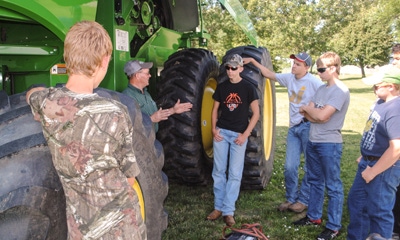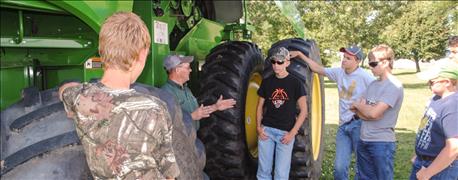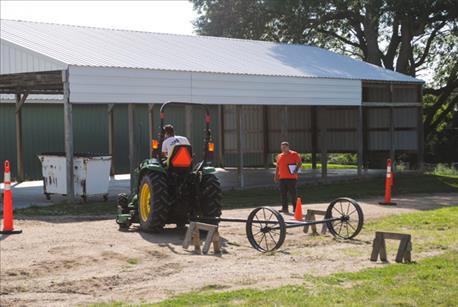
There were 105 youths killed in farm-related accidents last year in the U.S., and it is estimated that more than 32,000 youth are injured on farms each year. Ellen Duysen is the agricultural health center coordinator for the Central States Center for Agricultural Safety and Health at the University of Nebraska Medical Center. According to Duysen, ATV accidents are on the rise in Nebraska. Duysen also told youth participants in a Nebraska Extension-sponsored tractor and farm safety course in Wayne recently that livestock and falls pose additional risks for youth on the farm.

COMBINE DEMO: Alan Finn, Grossenburg Implement in Wayne, demonstrates how to properly jumpstart a combine battery at a recent tractor and farm machinery safety workshop for youth held in Wayne.
Learning the statistics and understanding the dangers of farming operations is all part of coursework for about 75 teens ages 14 and 15. The teens are participating in similar tractor safety sessions held at different locations spread across the state each June and July. This two-day certification course allows youth in that age group to legally operate tractors over 20 horsepower. and to hitch and unhitch implements while working on farms that are not operated by their parents. Certification is not required for family members working on their parents' farm, although it is highly recommended.
Alan Finn with Grossenburg Implement in Wayne has been helping with tractor safety courses for nearly 30 years. In a demonstration of how to properly jump-start a combine at the Wayne session, Finn emphasized the importance of wearing safety gear like goggles. He noted that most farm accidents occur when operators are hurried in their tasks and don't take time for safety precautions.

TRACTOR SKILLS: Students in the farm safety workshop were required to navigate a tractor driving skills course.
"Safety shields are on machines for a reason," Finn told the youth participants. "Make sure all the shields on implements are in place to prevent major injuries."
Fatigue, lack of focus and hurried tasks are main causes of farm accidents, Duysen said. "We have statistics that show farm accidents are more likely around 4 p.m. on a Friday afternoon, because we are often more focused on weekend activities than the tasks at hand," she explained.
During the coursework, students learn to establish a culture of safety on the farm and to recognize specific farm hazards. "Students learn recognition of hazard signs, hand signals and machinery symbols as well as safe operating procedures for tractors, pulling implements and ATVs," Duysen said. "They learn implement hitching and unhitching and Power Take Off [PTO] hookup and tractor driving skills."
Along with machinery operations, the students were exposed to a number of different implements like combines, balers, augers and skid loaders. They studied proper use of respiratory masks, earmuffs, earplugs, goggles and gloves. They also learned about pesticide risks and Nebraska law regarding tractors on roadways. The courses included one day of classroom work, a written test that they must pass and a tractor driving test.
"We also invited emergency medical technicians to speak at each of the sessions and talk to students about what to do in case of a farm accident or emergency," Duysen said. Along with Duysen, Aaron Yoder, an assistant professor at UNMC College of Public Health, teaches a portion of the course and conducts the tractor driving skills testing.
You can learn more about the coursework and youth farm safety procedures by contacting Duysen at [email protected].
About the Author(s)
You May Also Like






